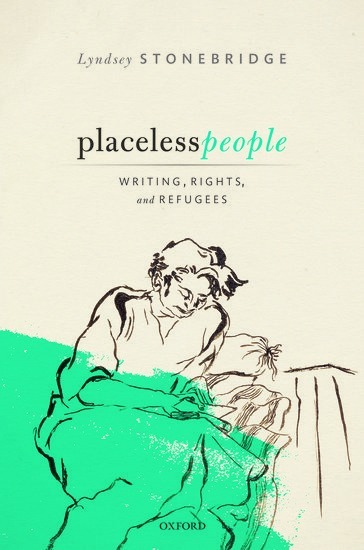
This article is a preview from the Winter 2019 edition of New Humanist
Placeless People: Writings, Rights and Refugees (Oxford University Press) by Lyndsey Stonebridge
How can the right words be found to speak to the experience of the placeless as well as the violent ruptures of displacement? This is one of the key motifs in Placeless People: Writings, Rights and Refugees, a new book by Lyndsey Stonebridge, a professor of humanities and human rights at the University of Birmingham. It focuses on the refugee upheavals of the 20th century, and a series of writers – from Simone Weil and Hannah Arendt to W. H. Auden and Edward Said – who were caught up in them. The stories of these writers are then used to reflect on human rights today. Words often fail us but this book reminds us how much writing matters.
Stonebridge argues that for placeless people – refugees, unwanted migrants – testimony becomes key: refugees have to tell their stories in limited and often stylised ways. This problem is there from the refugee interview with the Home Office to the literary seminar. It is a kind of “enforced testimony”, to borrow from the social historian Carolyn Steedman. It is a straightjacket in the clothes of benevolent expectation.
In one of my favourite passages, Stonebridge describes the Palestinian poet Yousif Qasmiyeh refusing an invitation to be a “witness writer” at an academic conference. Qasmiyeh writes: “Being a refugee should not require foregrounding one’s legal condition above all else, overshadowing one’s personal, professional and writing history.” His poem “Holes”, Stonebridge tells us, successfully “disrupts the categories that conditioned its writing”.
Writing matters because it can disrupt expectations and categories of thought. The theorist Paul Gilroy liked to chide his former colleagues with the slogan that “sociology is fiction but literature is truth”. He’s onto something there, because writing can be a place to find a home in a placeless condition. Edward Said and Theodor W. Adorno – philosophers who were both exiled from their homelands – are both guides here, in their suggestion that the only home available to them is in the fragile and vulnerable space on the page.
Stonebridge’s book includes Lili Andrieux’s drawing of a woman reading at Gurs, the French internment camp for refugees where the political theorist Hannah Arendt was sent in May 1940. Stonebridge writes: “To read a book in a detention camp is not only to escape a horrible reality; it is to affirm the possibility of an imagined world.” This is not a simple escape into nostalgia but a difficult confrontation with the technologies of modern violence and their totalitarian origins.
Stonebridge draws out the links between totalitarianism and racism in her account of George Orwell’s 1984. We often think of totalitarianism as simply oppression from above: everyone is taught to remember Room 101 and the rats in Orwell’s dystopian novel. We are not taught to remember the cinema audience laughing at footage of Jewish refugees drowning in the Mediterranean, a newsreel that draws Winston Smith into what William Hazlitt called “the pleasure of hating”. The sadistic celluloid portrayal recounted by Winston Smith is chilling to read, as bullets fly into a woman who tries in vain to protect her child, and bombs blast the refugee boats into matchwood. Here, in Orwell’s writing, we find the tussle between complicity in the violent spectacle and an attempt to develop a different kind of relation to those people in the crosshairs.
It is ironic that Orwell does this with his writing, when he himself expressed anti-Semitic views. Infamously, in his political diary there is a “fieldnote” that describes a “fearful Jewish woman, a regular comic paper cartoon of a Jewess, [who] fought her way off the train at Oxford Circus, landing blows on anyone who stood in her way”. It shows how even in the midst of his radicalism, Orwell struggled to reckon with the affective grip of racism. How relevant that is today. As Stonebridge comments, “Orwell was far more daring in his exploration of the modern mind than his critics often give him credit.”
If all writing ultimately fails, the authors Stonebridge guides us through somehow manage to fail better. This is a book about displacement but it offers us ways to feel at home despite these toxic and hateful times.

